“This Is Why Women Are So Dope”: Robin Thede, Natasha Lyonne and THR’s Comedy Showrunner Roundtable
- Oops!Something went wrong.Please try again later.
- Oops!Something went wrong.Please try again later.
- Oops!Something went wrong.Please try again later.
- Oops!Something went wrong.Please try again later.
- Oops!Something went wrong.Please try again later.

It was not by design that every participant on The Hollywood Reporter‘s Comedy Showrunner Emmy Roundtable was a woman. But, about one hour into an 80-minute Zoom over Memorial Day weekend, gender prompted a shared gripe: Female TV writers — even those as prolific as I Love That for You‘s Jessi Klein, Russian Doll‘s Natasha Lyonne, The Chair‘s Amanda Peet, What We Do in the Shadows‘ Stefani Robinson (who also writes and produces for Atlanta), Hacks‘ Jen Statsky and A Black Lady Sketch Show‘s Robin Thede — keep getting asked to step away from their own passion projects to assist on shows from male peers fearing cancellation. “Repulsive,” “insulting” and “insane” as that might be, it also proved to be a point of solidarity for the six comic veterans bonding over their anxiety and excellence. “I’m very into being a part of this gang,” said Lyonne. “See you all tonight at the coven.”
We have folks here mining comedy from cannibalism, suicide and faking cancer. What was the last scene you wrote that made you or your collaborators genuinely nervous?
More from The Hollywood Reporter
STEFANI ROBINSON On the most recent season of Atlanta, it was the cannibalized hands at the fancy dinner party. There was a lot of, “Can we do this? What does it look like? How do we prepare the human hands — fried, grilled, battered?” It got really specific. But when you’re in a writers room and having fun, that fun gets away from you. Once it’s time to shoot, you start questioning everything.
NATASHA LYONNE In our room, there was a lot of concern about this time-traveling, body-swapping, Quantum Leap thing we did with the characters. How far can you go with your own grandparent’s love interest before things become inappropriate? We had to do things to make it clear that even though my character was in the body of her mother, this guy she was with was not actually her father. That would be a bridge too far. What’s the right amount that’s kosher without it becoming a story we’re not trying to tell?
AMANDA PEET Well, my show hinges on a Sieg Heil. So we were in a state of terror the whole time. But the scariest thing for me was when Sandra Oh, my actress, would call and be like, “You need to rewrite this, because it’s not good enough.”
ROBINSON What? (Laughter.)
PEET Not in a bad way! She was right. I’m just saying, there’s sort of a combination for me of being terrified of not being kosher and the pressure from actors to not suck.
JESSI KLEIN Hard agree. Over the years, I’ve had nerves about things that feel too third rail-y. But there are also those rabbit holes you go down in a comedy room where something makes you laugh so hard as a group. Then, in the light of day, you wonder if it’s funny to anyone but us when we were punchy at 10 o’clock at night. Are we really spending several episodes following whether or not Molly Shannon’s character is allowed to sell crystal troll tchotchkes?
JEN STATSKY Every comedy room has that exact same problem. “Is this only funny to us? We’re absolutely insane and they’re going to pull us off the platform midstream.” We did this episode in season one — and I think it worked out, due to Jean Smart’s incredible performance — where she pays this misogynist comic $1.69 million to stop doing stand-up. I remember being a little bit scared if it would seem preachy or, like, feminist wish fulfillment. Now that comedy has evolved and gets to tell important stories, you’re also always trying to make sure you have the correct balance.
ROBIN THEDE I make a sketch show on a network that doesn’t give a fuck and has no boundaries. I’m scared of nothing. (Laughs.)
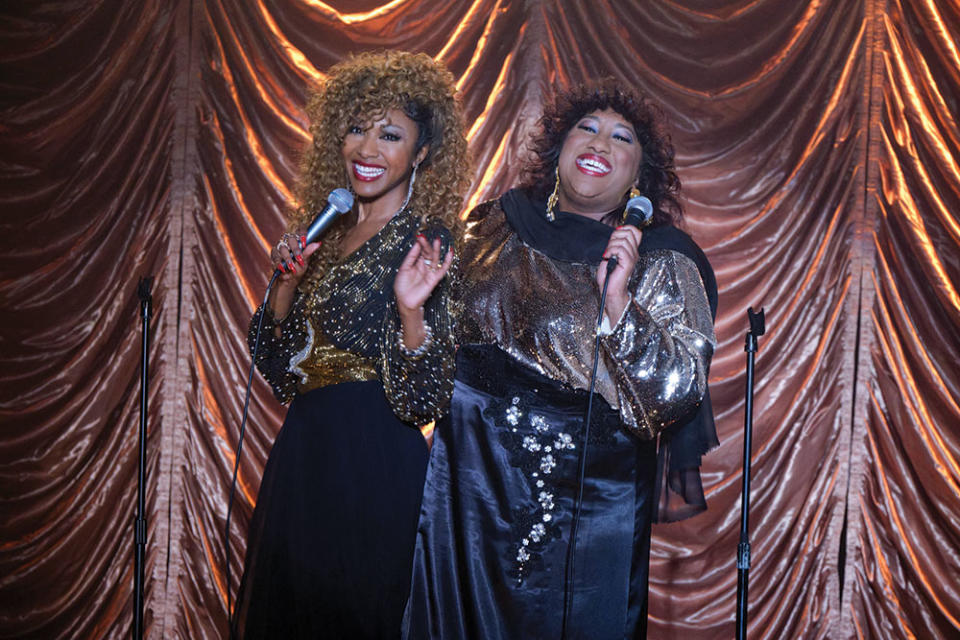
Courtesy of HBO
Amanda, you’ve said that, as an actor, you’ve felt like your opinions weren’t often respected on set. How do you all ensure your talent doesn’t feel the same without compromising your own vision?
PEET It’s a question of taste. As soon as you decide that you have an actor who’s really smart and really good at story and/or really funny, you want to take those notes. Even with studio notes, it’s my job to take the two out of 20 that feel right. But because I’m 50 and I’m old now, I feel much more collaborative than I used to.
KLEIN Great actors are the best weather vanes. You can tell immediately if something that you wrote isn’t working or isn’t right. Even if they’re trying to be really nice and muscle it forward for you, you’re like, “Oh, no.” That’s part of the fun too, that moment of the discovery that it was supposed to be the way you imagined.
ROBINSON It’s super important for the environment of the production. What We Do in the Shadows is a very collaborative show and there’s a lot of improvisation and rewriting on set with the actors and even the directors. During the first season, the actors didn’t know who the characters were yet. Now, four seasons in, you can see that the trust and all those conversations have made for a stronger show. That’s the marrow of great television, great anything.
THEDE Also kudos to Amanda for only taking two of 20 notes.
PEET Wait a minute … (Laughter.)
THEDE Very impressive. I wish I had the balls to only take two of 20 notes.
KLEIN Robin, I just wanted to say to you, I love your show so much. Having done a lot of sketch myself, it is a tonic and a joy to watch.
THEDE Thank you! That’s important. We center that joy, especially after COVID. The second season shot in August and September of 2020. There was no vaccine. There was no nothing! Shows were getting shut down left and right. Third season, still in a pandemic. Going into a fourth season, still in a fucking pandemic. But when people watched the show, they weren’t going to be like, “Let’s give them some grace because they shot it in COVID.” They weren’t going to give a fuck.
ROBINSON A lot of us have glossed over the COVID of it all. I’ve shot so much crap during the pandemic. It was hard, it was depressing, and we were away from family. On What We Do in the Shadows, we were locked away in Toronto in the middle of the winter and weren’t allowed to go outside. It just gets very dark when you are trying to make a show that’s funny and bring that light into the world. It felt a little bit like, “What the fuck are we doing?” We went through this thing and we went to work, put on the PPE and stood in rooms with a hundred people — which should not have been happening. It was all kinds of traumatic. I haven’t unpacked it.
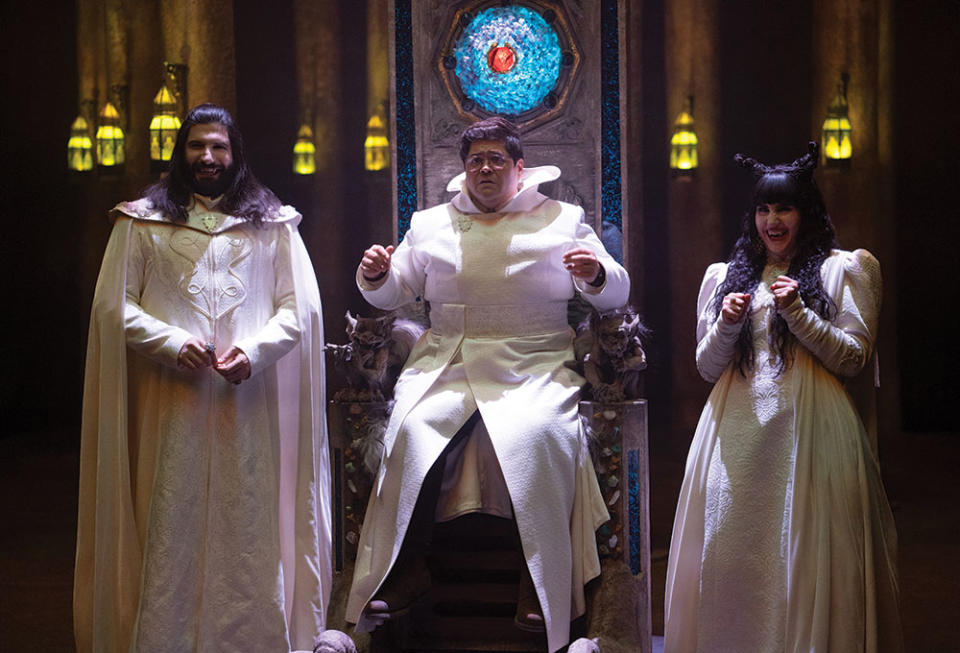
Russ Martin: FX
THEDE It is fucking traumatic. I know we’re just making TV — but, for all of us to do what we do, we’re wearing multiple hats. Y’all don’t get your props enough. So if no one else is going to give them to you, you’re getting them today.
LYONNE There is a real passion to it, too, because it’s all so insane. In a way, it’s just showbiz. The stakes have never been lower. Yet on a human level, when you’re a teenager who feels alone in the world and you find something that you identify with, it’s never been more important in the world. That can get you through one more day or one more night. You’re just determined to keep making it better and you just keep showing up, and it’s with the passion of, “This might be it,” every day. So we’d better make it worth it.
KLEIN And people’s time is very valuable. Having been around for so long as a staff writer on various things where I felt like my time was not respected in any way, I always want to be as efficient as possible so that everyone can go home and live. Especially in a writers room! Everyone has to go live their lives so that there are stories to tell. I’ve definitely worked in rooms where, bless us all, but …
THEDE The showrunner hated their spouse and didn’t want to go home? So you just stayed until 3 in the morning, every night?
KLEIN You said it, not me. (Laughs.) You want it to be worth it to every single person working on a show. It better have some joy to it. This should be a good part of people’s full human life.
Stefani, the most recent season of Atlanta was more of an anthology than earlier years.
ROBINSON Atlanta is very much Donald [Glover]’s vision and his baby. I’m just there to support that. But, having been in the writers room and approaching this season, we don’t give a fuck about what people think. They’re not part of the conversation. They’re not part of the development process. And I don’t mean that in a disrespectful way. I think the reason the show has resonated with fans is because that’s our approach. The conversations in the Atlanta room are very much like therapy — one-on-one, fighting, debating and making each other laugh. We’re close in a way that it feels familial and different from other writers rooms I’ve been in. What We Do in the Shadows is completely different. We do take into account what fans think and how the audience is relating to these characters. The character Guillermo [Harvey Guillén], for instance, has emerged as this access point for the audience. He’s a fan favorite in that way, and in a way that I don’t think that we anticipated, and we lean into that.
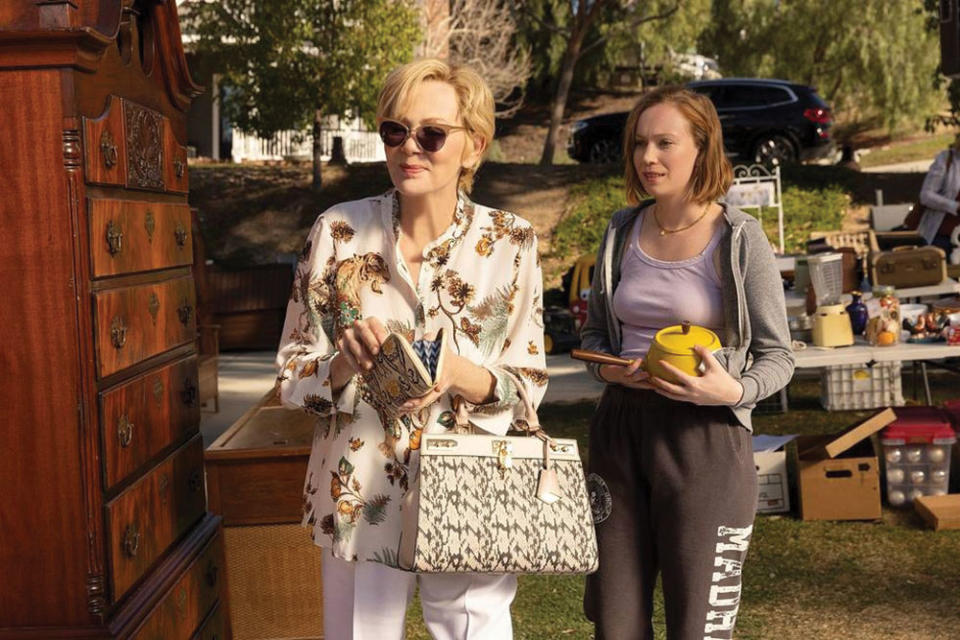
Courtesy of HBO MAX
Most of your series devote a lot of time and attention to older actresses. And, in the case of I Love That for You and Hacks, that includes sex scenes — something we don’t get to see too often. Did you get any pushback?
KLEIN We were given the incredible blessing of meeting with Jenifer Lewis — an iconic human being, top to tail — to play this character, Patricia. She was like, “Well, I picture Patricia as someone who fucks a lot of young men.” When Jenifer Lewis asks, you deliver. It clicked into this character, who’s very intense and controlling. And Jenifer is so beautiful. It just makes sense that she occasionally bumps into some young, hot studs in the world and casually has sex with them at her home.
STATSKY We never got any pushback. It was celebrated and encouraged. And, Jessi, you’ve probably seen this, too: When the audience watches it, they love it. They want more of it. There’s this big lie that we have been sold — that women get less interesting as they get older. They get more interesting. The goal with our show, and your show, is to show the full lives of women at any age. Sexuality is, of course, a big part of it.
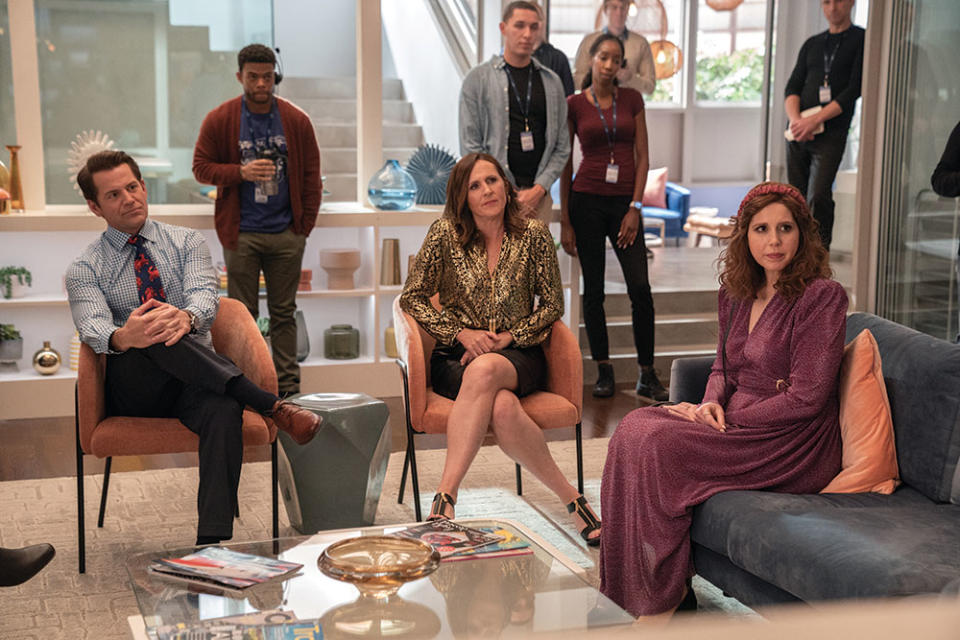
Courtesy of Nicole Wilder/SHOWTIME
The Chair isn’t just your first time showrunning, Amanda; it’s your first time writing or producing for TV. Were there attempts along the way that just didn’t come to fruition?
PEET There are tons of really bad scripts in the drawer. I always started out writing for myself, thinking I would star in them. Part of that was the desperation to get a good part and prove that I had some kind of acting chops. The writing usually starts from that sadness and anger that I haven’t gotten the right part. Then, as soon as I have liftoff, I’m just completely uninspired by the idea of myself and start fantasizing about somebody like Sandra Oh. I also got more and more confident in [my ability to write]. A lot of it came from having certain people in my corner. My husband [David Benioff] is a writer-showrunner. So I have those people who are like, “Go for it. We all think we suck. Just keep going.”
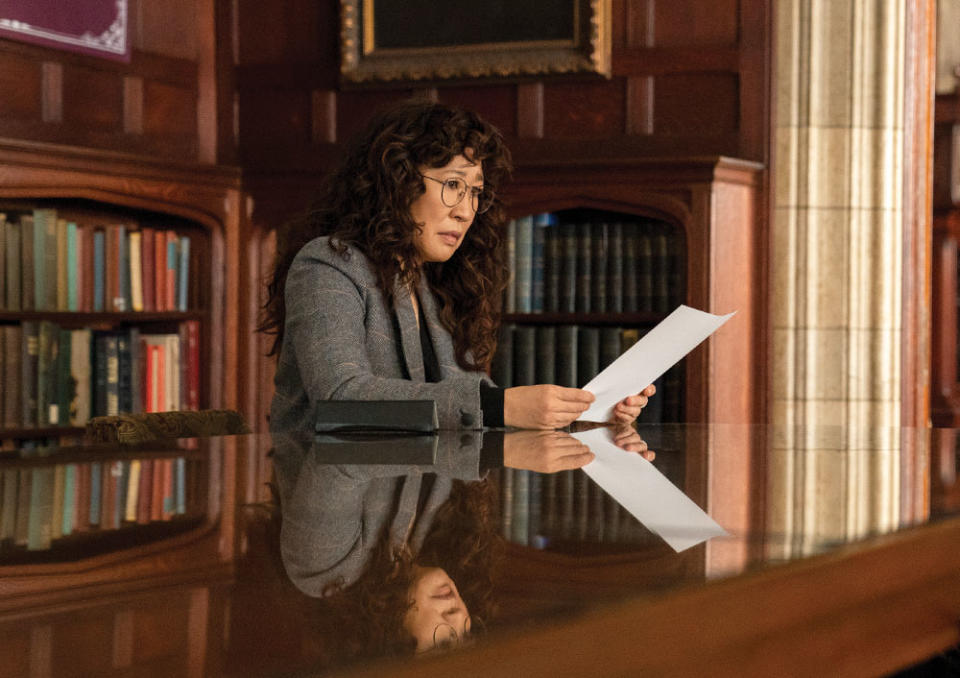
Courtesy of ELIZA MORSE/NETFLIX
LYONNE For me, it was Jenji Kohan and Amy Poehler that were so encouraging. I did not want to showrun the second season of Russian Doll. When Leslye [Headland] went to do Star Wars, we tried getting other people to do the job. Eventually, Jenji sat me down in this weird Thai joint in some parking lot and said, “Kid, explain to me what you’re doing on the show.” I was like, “Well, writing, casting, editing, music department head, staffing, freaking out about the budget.” She’s like, “OK, that’s the whole enchilada. You’re holding the vision of the show. It’s your show. You got this.” Nobody is ever 100 percent prepared for the big leap.
Since we have a quorum of your peers, Jen, can you tell me about your experience writing a comedy about comedy writers and stand-up? What’s been the response from the people you’re lampooning?
THEDE You hear from any agents’ assistants? (Laughs.)
STATSKY When we pitched the idea, we were always pretty nervous about the show business aspect. Stand-up that doesn’t feel authentic onscreen is so cringey. It’s painful. We wanted to make the show as a tribute to so many female comedians who we love and admire, who we felt never really got their due in the way their male counterparts did. To hear from some of those women and to hear from female stand-ups who say, “This really connected for me,” or, “I see myself in this character,” has been such an incredible gift. Writing the stand-up part was really nerve-wracking. Stand-ups are absolutely vicious. We were like, “They will tear this apart if it feels fake.”
KLEIN I was a stand-up addict from as early as I can remember. My weekends were spent watching all the shows that were available on Comedy Central or VH1. I would sit there and be like, “I love these women.” None of them broke through the way men did. People like Paula Poundstone or Judy Tenuta, you never hear of them [anymore]. To me, it just validates over and over again that when a female point of view — the things we notice and find funny or profound or disturbing or whatever — is allowed space, there’s just so much story to tell.
ROBINSON What I love about all of your shows is just seeing women be stupid and funny and silly and ridiculous and contradictory and able to make fools of themselves. That’s not a bad thing, and it’s part of the dimension of being a female. I feel like somewhere along the line, that almost got beaten out of me as a woman, that silliness or feeling unashamed to look stupid or strange or to say the wrong thing. It’s OK not to know. And it’s important to just see funny women being funny.
THEDE This is why women are so dope. If we did have white men on this panel, they would be like, “As a white man, I just feel like our voices are not heard.” It’s like the burden on women showrunners, on top of making all of this literal award-winning television that is on this panel, to also shine a light on the Elayne Booslers and Ellen Cleghornes — these women who didn’t get to shine at their time, who had to work in a period where there was an absolute ceiling. Future generations will look back on us and go, “Man, how the fuck did they do that?”
LYONNE I don’t want to be emo, but it’s very powerful that this kind of work is happening in this moment. Showrunning is intense, but it’s also a lot of fun to be in charge and to feel like there is all that weight and all that history to it and this additional strangeness around being a woman. It’s like a shared win for all of us because you don’t want to be seen as a trend. It’s always very minimizing to have to play these games around “women in comedy,” “female showrunners” or any of these qualifiers that minimize the work.
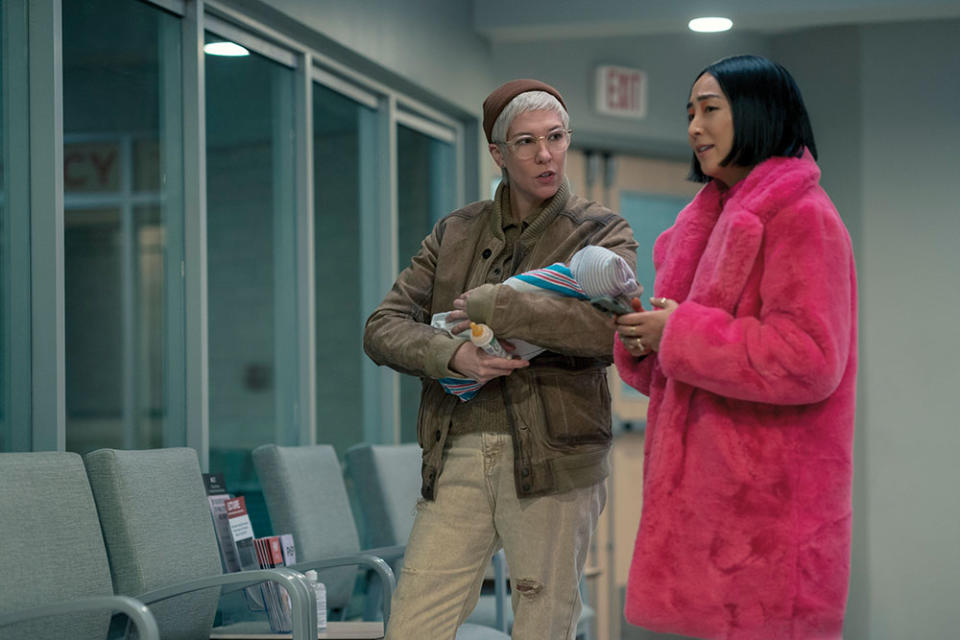
Courtesy of Vanessa Clifton/Netflix
Robin, have white men openly complained to you about suffering from a lack of opportunity?
THEDE Yes, and I think we’re hearing it more and more. I have definitely had white men say to me, “Well, it’s impossible to get an agent anymore, because I’m a white man,” or, “Obviously, I haven’t show-run in years because I’m a white, middle-aged man.” I’m like, “Yeah, I don’t know what you’re looking for from me …” There is a myth, a rumor going around Hollywood that white men are no longer employable. And that is absolutely false. Women and people of color still make up single digits in most high-ranking roles — in front of the camera and behind the camera. If that were not true, I would not struggle so hard on my show to ensure that my crew was diverse.
ROBINSON Something I find equally repulsive is when a man will have a pitch for a show starring a woman, starring a woman of color, and come to me and say, “I can’t do this. I’ll be crucified because I’m a white guy. You’ll take my scraps. Right?” They’ve said things like, “I’ve done all the work, I’ve figured out the story, you would just need to go write it.” And these are popular directors and writers.
THEDE Accomplished men! Huge names!
ROBINSON Another one, which was just so insane, is, “No, Stefani, I don’t need your help with the story. I just need some of that urban dialogue.”
THEDE Whoa! I wish I could name names. Stefani, how many Black women showrunners do you think are in Hollywood right now? Maybe 20? There’s not a lot of us. They come to us and they say these things and they go, “We know you’re really busy, but this idea’s great and we just need you to fix it.” It’s not always white men, either.
LYONNE By the way, it is also women. It’s a many-pronged, systemic issue. It’s rampant in the submissions that come into [my and Maya Rudolph’s] production company, this idea of, “You would be so lucky to come on.” Stefani and Robin, you’re in demand. The idea that you would leave your own project to go piggyback on somebody else’s half-baked idea like it’s a gift? We know that doing one thing well is utterly time-consuming.
ROBINSON Exactly. Then you feel like an idiot for looking forward to the meeting and getting on the subway or getting in the car to go see this person. It’s just the most insulting, hurtful thing.
THEDE P.S., their great ideas are never great. I don’t think any of us thinks we’re better than anyone else, but we certainly know what our time is worth. And a green writer who’s just starting out? That’s not their job, either. Let them tell their stories. But to look at a writer of the caliber of any of the women here and say, “You ought to be grateful that I’m calling you to shine this turd …”
STATSKY Women are carrying these scars. Stefani has to get back in her car and go back to her job where she has a show to run — which, as we’ve established, is hard enough — and carry all that bullshit. Not to say that showrunners who are male don’t bring their own shit and trauma to work, but all of us here, as women, have dealt with 8 million examples like that.
If you can’t name names, someone should at least make some private spreadsheet of the people pulling these stunts so other women don’t waste their time.
THEDE The point of this is not to attack white men; it’s to say that we are in a business where women do this incredibly hard job at an incredibly high level but still have to deal with bullshit from a lot of sources. Just respect people’s fucking work and give them credit for what they’re doing, because what they’re doing is really hard.
ROBINSON But we should put a list together … just to know.
STATSKY I don’t know if Google has the drive space. (Laughter.)
LYONNE Statsky, too far. You don’t talk about the Cloud like that.
Interview edited for length and clarity.
This story first appeared in a June stand-alone issue of The Hollywood Reporter magazine. To receive the magazine, click here to subscribe.
Best of The Hollywood Reporter

